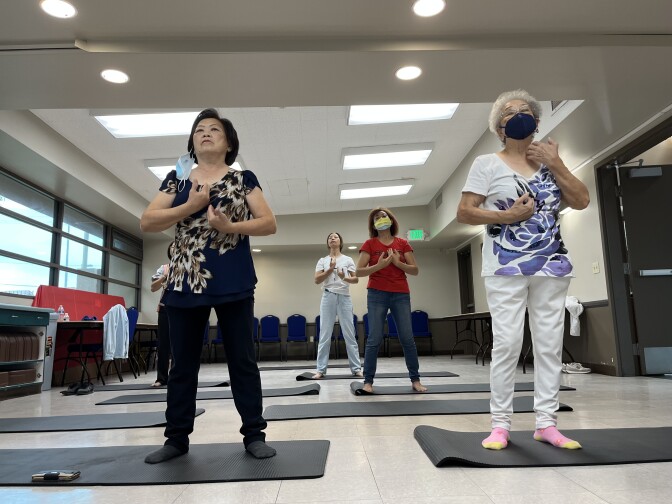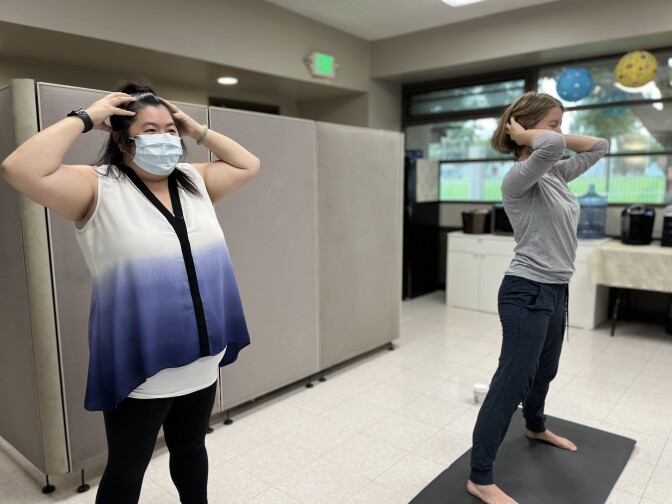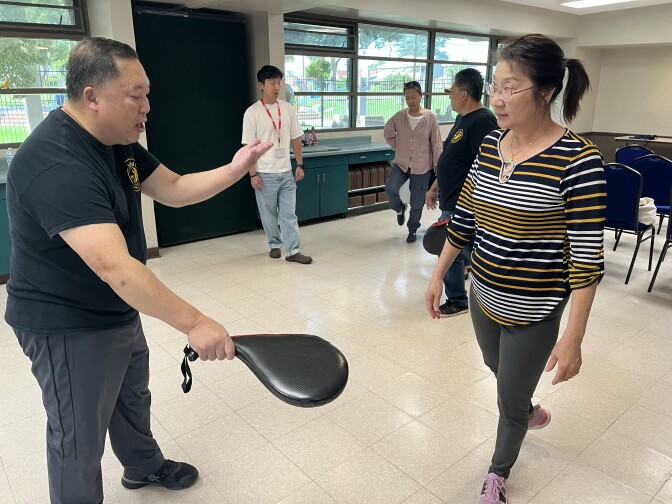This story is free to read because readers choose to support LAist. If you find value in independent local reporting, make a donation to power our newsroom today.
For Monterey Park’s Shooting Survivors, A Place To Mend The Mind And Spirit

In a sparse multi-purpose room, a handful of middle-aged Chinese American women have rolled out black yoga mats and are studying the moves of a qigong instructor gently giving instructions.
Inhale. Gather. Exhale.
Qigong — a mind-body-spirit practice using simple, repetitive exercises — is being offered at a new center in Monterey Park with a grimly-specific mission: tending to survivors and community members after the deadliest shooting in L.A. County history took place in their city.

Stretch through your wrists, and relax.
Less than a mile from where the women focus on breath work, a gunman entered the Star Dance Ballroom Studio on Jan. 21 and fired on a crowd of mostly older Asian Americans celebrating the start of Lunar New Year. Eleven people died and nine others were injured.
Up until the shooting, Monterey Park was best-known for being America’s first suburban Chinatown, with a population of 62,000 that is two-thirds Asian.
Now it’s on a long list of places reeling from mass gun violence — and part of a smaller but growing network of cities that are opening federally-funded “resiliency centers” to help with recovery.
Triage, then healing
Mass shootings are not only increasingly commonplace in the U.S. — 550 so far this year — they've grown in lethality over the past decade. Shootings in which four or more people are killed have nearly doubled.
Typically after the deadliest incidents, a crisis response team from the FBI parachutes into a community to set up a family assistance center, drawing help from local nonprofits with community ties. That was particularly key in Monterey Park with its large immigrant population. The lead nonprofit on the ground was the Chinatown Service Center, which typically provides medical and behavioral health services, but found itself helping victims’ families with burial services.
“That's really important to be able to speak the language and to understand how communities respond culturally when events like this happen,” said Kristina Rose, who heads the Office for Victims of Crime in the Department of Justice.
Monterey Park Resiliency Center
311 N. Rural Dr., Monterey Park, CA 91755 (currently housed inside the Sierra Vista Park Community Center)
E-mail: mpkhoperc@cscla.org
Ph: 626-609-3399
Website: https://www.mpkhope.com/
Hours: Monday, Tuesday, Wednesday and Friday, 9 a.m. to 6 p.m. Thursday, 9 a.m. to 7 p.m.
More and more communities have been transitioning their family assistance centers into long-term operations. Over the last decade, the Department of Justice has met the demand by awarding millions of dollars in grants to about 20 communities that want to provide ongoing legal aid, victim's advocacy and mental health counseling to survivors.
Over the last two years, resiliency centers have opened in Uvalde, Texas and Buffalo, New York. A few years earlier, a resiliency center opened in Las Vegas after the nation’s deadliest mass shooting.

When it became evident there was support for a resiliency center in Monterey Park, the Chinatown Service Center was a clear choice to operate the center, said Rose, whose office is currently working on the grant process with the nonprofit.
The MPK Hope Resiliency Center, as it is officially called, has been averaging about 80 visits a week since it fully opened in September. It’s a number that staff want to increase, given the hundreds of people they could be potentially serving along with partner organizations such as Asian Americans Advancing Justice Southern California and the L.A. County District Attorney’s Office.
Bringing mental health awareness
Notice how you feel, anything starting to open up.
The qigong instructor, Dr. Sara Ptasnik is a physician at the Chinatown Service Center. She doesn’t speak Mandarin or Cantonese like her students, so the center’s case management coordinator, Janet Yu, interprets the best she can, toggling between both languages.
Offering in-language help is a priority at the Monterey Park center, but cultural competency extends beyond translating materials, according to its director Nina Loc.
“When it comes to the Asian population, it's more of the lack of awareness, lack of willingness to accept that there could be mental health issue within a family or within the culture,” said Loc who also serves as the behavioral health director at Chinatown Service Center.

Loc said the inclination for many in the community is to not seek out counseling, which research bears out. A 2018 study by the federal Office of Minority Health found Asians were 60% less likely to have received mental health treatment than white people.
The Monterey Park center offers both individual and group therapy with the understanding that it’s not for everyone, especially an older, foreign-born generation.
That’s why there’s so much emphasis on offering stress-reduction activities such as yoga, Buddhist chanting, beading, cooking or journaling.
“We have heard a lot of individuals that don't feel comfortable going out,” Loc said. “These are signs that they're affected by [the shooting]. Hopefully coming through to the center, they could learn coping skills to be more comfortable with the new norm.”
And, Loc added, they may become more receptive to trying therapy in the future.
Ways to talk to Asian American elders about mental health:
- Share how you went to a therapist for a problem, like with work or school. Then list the ways a therapist has helped.
- Be open-minded and curious about the elder's viewpoints.
- If the elder is not interested in traditional therapy, see if they would like to talk to someone at church or temple.
Read more here.
Open “essentially forever”

For some survivors, it may take months, if not years, to recognize they need help.
That’s the experience of staff at the resiliency center in Las Vegas. In 2017, a gunman killed 58 people and injured hundreds at a country music festival on the Las Vegas Strip. Years later, two more people died from shooting-related injuries.
Tyler Winkler, a victim right’s attorney at the center, said the five-year anniversary of the shooting last year served as a prompt for some survivors.
“That brought in a lot of folks who were like, ‘Wow, I think maybe I'm ready to see what you guys have going on,'” Winkler said.
Winkler said survivors’ trauma can stay buried for years — until it doesn’t.

“They know lots of people were really affected by it but they don’t see it in themselves,” Winkler said. “Maybe they start noticing, ‘I’m snapping at my family more or I’m drinking more. I feel numb.'”
The center has worked with more than 10,000 people so far — survivors, first responders, their families — but estimates there are still many other people experiencing trauma who haven’t used their services. Winkler said that’s why the Vegas center is staying open for “essentially forever” — to be there for those people who need more time.
When the federal grant ended after four years, the Nevada state and Clark County government ponied up funding to keep the center open, and to extend services to other crime victims who were not part of the shooting, Winkler said.
Still, other centers have determined they've outlived their purpose and have wound down like the one in Newtown, Conn. Many of the child survivors of the 2014 Sandy Hook Elementary School shooting are now graduating high school, its executive director noted.
When the world doesn’t feel safe

For the staff at the center in Monterey Park, staying open long-term is the goal.
The center is being run out of several rooms provided by the city at the Sierra Vista Community Center. But staff are hoping to lease a larger, permanent home to accommodate newcomers such as Maria Liang, the former owner of the Star Ballroom Dance Studio.
Liang, an avid dancer herself, wasn’t there the night of the shooting. But her brother was overseeing the Lunar New Year event at the studio, where he was injured, along with close friends and patrons she’d known for years.
“Some died and some were injured and now I decide that I close my business,” Liang said.
Liang visited the center this month to take a class for the first time. She followed the self-defense moves of kung fu instructor Benson Lee with ease. “It’s like dancing,” she explained.

Liang, switching to Mandarin, said she tried the class because the world doesn’t feel safe and she wanted to learn better awareness and ways to protect herself.
She plans to return; another class has piqued her interest. Qigong, she said brightly, is good for your body.
A place of their own
Liang had been handed a calendar of activities the night before when she attended a private event for survivors held at the community center.
Hung in the lobby were blue paper hearts honoring the shooting victims. They had been displayed outside Monterey Park City Hall on signposts for months before being moved to their permanent home with the center.
As soft music tinkled in the background, some of the survivors took part in a painting activity. Then, a few spontaneously started to dance, Loc said.
“I'm getting goosebumps,” Loc said, recalling the night. “It was really, really touching.”
But, she added, “our work is not done yet.”
“Some can go back to dancing, some cannot,” she said. “We're not here to force anybody in any direction but you can provide them with tools.”
MORE MENTAL HEALTH RESOURCES FOR THE AAPI COMMUNITY
- The Chinatown Service Center's behavioral health team is offering on call support at: 213-808-1700
- The Asian Mental Health Collective has a U.S. therapist directory with professionals who specialize in serving the AAPI community.
- AMHC also has a range of free mental health support groups.
- The AAPI Equity Alliance has put together a resource directory for those in need of trauma support
- NAMI California’s list of AAPI mental health resources
- The Asians For Mental Health Therapist Directory
- The California Victims Compensation Board reimburses mental health services for victims and their families.
- Changing Tides, part of the Little Tokyo Service Center, offers stipends for AAPI youth seeking therapy. (https://thechangingtides.org/)










